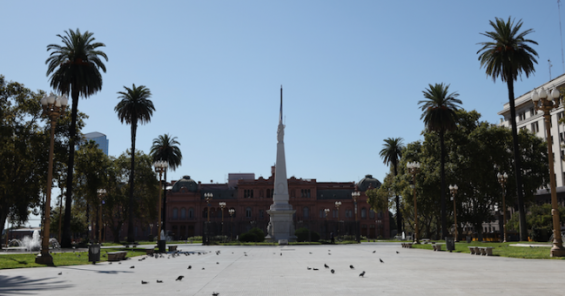Trade unions in Argentina are playing a major part in the country’s fight against coronavirus, where the pandemic has been met with decisive government action backed by public support.
Since the country went into lockdown on 20 March, the city of tango, Buenos Aires, is eerily quiet. Usually, between eight or nine million people come from Greater Buenos Aires to Buenos Aires City. Today, only 200,000 can enter the capital.
“Our main concern is the spread of the virus into the Greater Buenos Aires, where we have a concentration of the lower middle classes and poor and informal workers living in extremely precarious conditions,” said UNI Global Union President Ruben Cortina.
In contrast to his Brazilian neighbour and counterpart, Argentinian president, Alberto Fernandez, said he has chosen to “take care of lives” over the economy, although the government is also offering subsidies to businesses to help them through the lockdown.
Trade unions have backed government measures to contain the spread of the virus and made hotels and health care facilities owned by unions available to the national public health system.
National trade union federation have also been busy negotiating with employers to regulate opening hours, agree salary compensation for front line workers, and ensure protective measures for workers.
FAECYS, a federation of unions representing retail workers, negotiated a protocol with the National Hypermarkets Association awarding a special bonus for workers in grocery stores which, together with pharmacies, are some of the few places authorized to open.
At the beginning of the COVID outbreak, shopping malls were against closing but after FAECYS began negotiations with the Chamber of Commerce, and organized pickets and worker demonstrations, all shopping malls were closed.
The Argentinian federation of health care workers, FATSA, secured a guarantee from the government that all public and private sector healthcare workers who are in quarantine (voluntarily or under public health orders) will continue to earn their full salaries while out of work.
Héctor Daer, FATSA Deputy Secretary and President of UNI Americas, Héctor Daer, said:
“The Argentine government had a remarkably positively reaction to our requests. It is essential to guarantee workers’ wages because today the fear of loss of income can cause the crisis to worsen.”
FATSA has also negotiated free transport for healthcare workers during the pandemic, subsidized by the government.
Unions in other UNI sectors are also contributing to the fight against Covid-19 and protecting their members. For example, Los Bancarios negotiated an agreement which would allow a reduced number of bank workers to come to the branches in order to distribute retirement bonuses to the elderly, many of whom do not have cards for electronic banking.
“Everything is well organized to keep the curve of infection as flat as possible,” said Ruben Cortina. “Everybody knows that it is going to be worse if people do not respect the rules. Everything is uncertain but my federation, FAECYS, is on the frontline and many other initiatives to support commerce workers will follow shortly.”
Christy Hoffman, UNI General Secretary, said:
“We commend trade unions in Argentina, which are playing a key role in helping to slow the spread of coronavirus in the country. In fighting to protect workers on the frontlines and share their resources with the state, they are not only doing a service to their members, but to the nation as a whole.”



